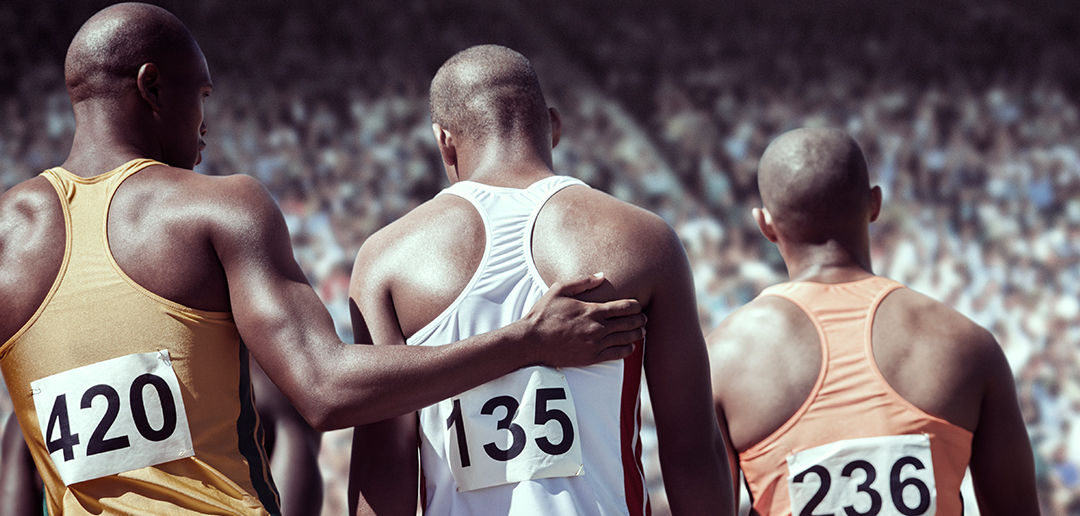It had rained the night before and now temperatures dipped below freezing, so the ground was more like a block of ice than a soccer field. The wind had picked up to forty miles per hour and was blowing directly against us in the second half. When our goalie punted the ball, it blew back to the point of having to save it from going into our own goal.
Eight minutes to go and the State Championship game was tied 1-1.
Our opponent was dribbling down the sideline, and crossed the ball toward our goal. I was guarding my opponent by the near post and the ball was coming right for me. I stepped forward to head the ball and clear it out of bounds, but instead of heading the ball out, it hit the side of my head and went into our goal. When the final whistle blew, I fell to my knees in disbelief and tears as we ended up losing the state title, 2-1.
Learning to get past myself
As I recount that story many years later, some emotion still stirs within me. But something else happened that day that I will never forget.
A dear friend and former teammate of mine was by my side only moments later, kneeling down to lift me up so she could embrace me. As she spoke words of comfort, I was humbled and speechless. The incredible thing wasn’t just that she traveled four hours to watch the game or that she endured the frigid temperatures to cheer us on. What blew me away was that she had just lost her dad the week before—and she was speaking words of comfort to me.
Don’t get me wrong. It’s heartbreaking to lose a championship game, especially when you score the winning goal for the opposing team. And to top it off, this was the third year in a row we had gotten to the state championship game and lost.
But the pain of this loss was short-lived in comparison to previous seasons. This particular day my perspective changed.
I had lost a game. My friend had lost her father.
What sports teach us about ourselves
How we respond to loss in competition says a lot about us—about our character. In fact, dealing with loss, overcoming adversity, and managing disappointment are some of the biggest and most important lessons sports can teach.
That day I was sad to lose the title. But I was more heartbroken and concerned for my friend. As a team leader, I asked myself where I needed to step up and lead by example. Where do I need to take responsibility? What do I need to improve? How’s my attitude? Who do I need to encourage? Who do I need to challenge in a positive way?
As a friend, I asked myself how I could be a support to her as she walked the difficult journey of grief.
Being involved with sports changes our lives. We train to become the best we can be. We learn so many skills that prepare us for life: Teamwork. Perseverance. Dedication. Hard work. Endurance. Sacrifice. Listening. Grit. Sportsmanship. Community. Selflessness. Leadership.
The list goes on and on.
A lot of weight is put on winning. It’s obviously the goal of any athlete to become the best at your sport. We love competition and want to hold that trophy at the end of our season.
But it’s also important to keep it in perspective.
We need to win at “life”
Winning at life far outweighs winning on a field, a court or in a pool. How are we showing up in life? The relationships we have and build with our family, friends and teammates are paramount. How are we investing in them and communicating love to them? Building into the community where we currently live: loving and caring for those who are less fortunate; mentoring at-risk youth; visiting the elderly; serving those in need. How are we getting involved?
Helping make the world a better place by being better humans carries far more weight in the grand scheme of things.
God cares more about who we are becoming in the process.
“Don’t you realize that in a race everyone runs, but only one person gets the prize? So run to win! All athletes are disciplined in their training. They do it to win a prize that will fade away, but we do it for an eternal prize. So I run with purpose in every step. I am not just shadowboxing. I discipline my body like an athlete, training it to do what it should. Otherwise, I fear that after preaching to others I myself might be disqualified (1 Corinthians 9:24-27).
Giving all we’ve got and being disciplined in our training as an athlete to become the best we can be honors God. We just need to remember that this pursuit is for a prize that will fade.
Training to win an eternal prize that will never fade for which God has called us is a high calling and one we can’t do in our own strength. God gave us His Holy Spirit to live the life He called us to. It’s a moment by moment, day by day journey that takes place over time. We need to live on purpose with the decisions and choices we make because that impacts our tomorrow.
He transforms how we show up, how we live, and how we respond which could make all the difference in the world to someone who needs to be touched by the love and hope that is within us.
As a side note: The following year (my senior year), I scored the winning goal for OUR team, and we won the State Championship!
Some ways you can run for the prize
Training for life:
Call family members on a regular basis
Read your Bible regularly (YouVersion app has a lot of reading plans to help you)
Be in community with other believers – find a local church, get involved in a Bible study/small group – we grow best in community!
Visit elderly in a nursing home (ask front desk for those who don’t have visitors)
Become more aware of teammates’ lives outside of sport – how can you be a friend when life is hard (broken relationships, illness, financial concerns, academic struggles, etc.)
Volunteer in community (food pantry, shelter, tutoring, Big Brother/Big Sister, Habitat for Humanity, etc)
Training as an athlete:
Give maximum effort and be coachable at all times (practices and games)
Make intelligent decisions
Compete at all times (never give up)
Have situational awareness (know how much time is on clock, know strategy for specific situations)
Play with the same intensity and effort every play
Be unselfish
Demonstrate sportsmanship at all times
To learn more about Amy’s one-on-one or group coaching for current athletes and athletes in transition, as well as her leadership training, go to www.amysnowcoaching.com.














